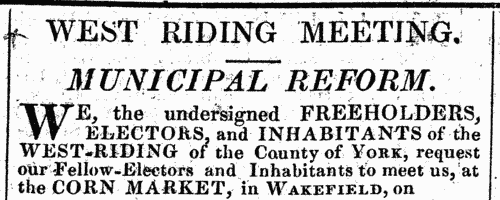Our indexes include entries for the spelling bell. In the period you have requested, we have the following 3,791 records (displaying 1,641 to 1,650):
Insolvents
(1835)
Insolvency notices for England and Wales: insolvency often caused people to restart their lives elsewhere, so these are an important source for lost links | Sample scan, click to enlarge

|
Irish Insolvents
(1835)
Insolvency notices for Ireland: insolvency often caused people to restart their lives elsewhere, so these are an important source for lost links, especially for emigrants | Sample scan, click to enlarge

|
Petitioning Creditors and Solicitors
(1835)
Principal creditors petitioning to force a bankruptcy (but often close relatives of the bankrupt helping to protect his assets): and solicitors | Sample scan, click to enlarge

|
Scottish Bankrupts
(1835)
Scotch Sequestrations: bankruptcy often caused people to restart their lives elsewhere, so these are an important source for lost links
| Sample scan, click to enlarge

|
Trustees and Solicitors
(1835)
Trustees appointed to take over bankrupts' estates, and their solicitors. Trustees are often friends or relatives of the bankrupt: and/or principal creditors
| Sample scan, click to enlarge

|
Unclaimed Dividends
(1835)
Names of creditors yet to claim dividends from bankrupts' estates | Sample scan, click to enlarge

|
West Riding Freeholders, Electors and Inhabitants
(1835)
The Leeds Times for 29 August 1835 (iii 130 1) carried this advertisement, entitled West Riding Meeting: Municipal Reform: 'WE, the undersigned FREEHOLDERS, ELECTORS, and INHABITANTS of the WEST-RIDING of the County of YORK, request our Fellow-Electors and Inhabitants to meet us, at the CORN MARKET, in WAKEFIELD, on MONDAY, the THIRTY-FIRST of AUGUST INST., At Eleven o’Clock in the Forenoon, to express the Opinions of the Riding on the Measure of CORPORATION REFORM proposed by his Majesty’s Ministers, passed by the House of Commons, and subsequently mangled and transformed by the House of Lords; and to consider of the Propriety of addressing his Majesty and his Majesty’s Ministers, and of Petitioning the House of Commons on this important Measure.' There then follow the names, occupations and addresses of nearly 2000 signatories.
| Sample scan, click to enlarge

|
Tradesmen of Lynn in Norfolk
(1292-1836)
Lists of admissions of freemen of Lynn from the earliest surviving records to 1836 were published by the Norfolk and Norwich Archaeological Society in 1913. These lists were extracted from the tallage rolls of 1291 to 1306; the Red Register of Lynn from 1342 to 1395; from the assembly rolls for the reigns of Henry IV and V [1399 to 1422]; from the hall books from 1423; and from a list of freemen starting in 1443 in the Book of Oaths (but itself abstracted from entries in the hall books). Freedom of the borough, necessary to practise a trade there, could be obtained by birth (in which case the father's name and occupation are usually given); by apprenticeship to a freeman (the master's name and occupation being given); by gratuity; or by purchase. Both the freemen and the masters listed are indexed here. The main abbreviations used are: B., freedom taken up by right of birth; A., freedom taken up by right of apprenticeship; G., freedom granted by order of assembly (gratuity); and P., freedom acquired by purchase. | Sample scan, click to enlarge

|
Poachers committed to prison at Beverley in Yorkshire
(1833-1836)
In response to a parliamentary enquiry, returns were made in early 1836 from each of the gaols in England and Wales of the number of commitments, prosecutions, convictions and sentences under the game laws since 1 November 1833. The returns varied in scope; most give the full name of each poacher, date, and sentence. The usual offence is that of 'poaching', i. e. being out armed in the night in pursuit of game; occasionally it was aggravated by assaulting a gamekeeper &c. | Sample scan, click to enlarge

|
Poachers committed to prison at Carlisle
(1833-1836)
In response to a parliamentary enquiry, returns were made in early 1836 from each of the gaols in England and Wales of the number of commitments, prosecutions, convictions and sentences under the game laws since 1 November 1833. The returns varied in scope; most give the full name of each poacher, date, and sentence. The usual offence is that of 'poaching', i. e. being out armed in the night in pursuit of game; occasionally it was aggravated by assaulting a gamekeeper &c. | Sample scan, click to enlarge

|
Research your ancestry, family history, genealogy and one-name study by direct access to original records and archives indexed by surname.











